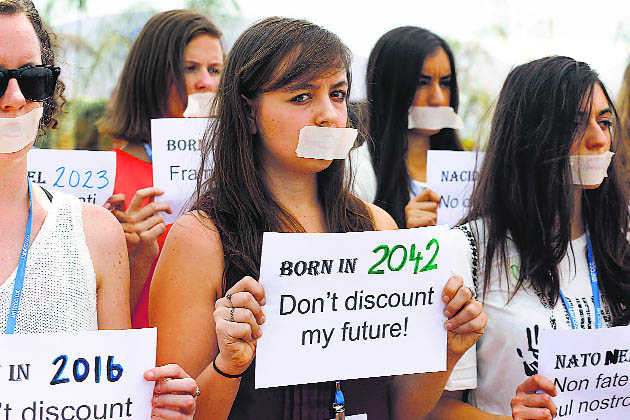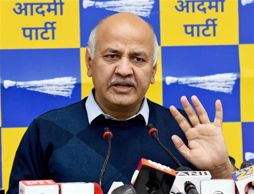
Activists at last year’s UN Climate Change Conference in Lima. The youth constituency of the UN’s climate change panel wants a reduction in fossil fuel emissions by 2050.Reuters
Rita Sharma
Ahead of the Climate Change Conference in Paris in December, India submitted to the United Nations Framework Convention on Climate Change (UNFCCC) its voluntary pledges for climate change mitigation and adaptation action in the Intended Nationally Determined Contributions (INDCs). It is notable that India's INDCs are titled, "Working towards climate justice." The shift in focus from "climate change" to "climate justice" was emphasised by Prime Minister Narendra Modi in his address to the UN General Assembly recently. He stated that:"When we speak only of climate change, there is a perception of our desire to secure the comforts of our lifestyle, when we speak of climate justice, we demonstrate our sensitivity and resolve to secure the future of the poor from the perils of natural disasters."
Climate justice focuses our attention on people over and above that of rising temperatures, receding glaciers and melting polar ice-caps. The rural poor, especially in developing countries, rely heavily on climate-sensitive sectors such as agriculture and natural resources for their livelihoods. They are among the most vulnerable to climate variability. Their vulnerabilities to water stress, loss of soil fertility and dwindling biodiversity is further exacerbated by increased frequency and severity of climate change-induced natural disasters.
Shining the spotlight on climate justice forces attention on adaptation, a collection of coping strategies seeking to lower the risks posed by climate change. The discourse on climate change thus far has disproportionately favoured mitigation measures over adaptation. The ends of climate justice, however, will be served in building the resilience of millions of smallholders, farmers, pastoralists, forest-dwellers, herders and fisher-folk, against the ill-effects of climate change. This is not to detract from the importance of mitigation action, but to plead for strengthening adaptation measures.
India's INDCs place greater emphasis on mitigation. Specific targets are related to 35 per cent reduction of emission intensity, creation of additional carbon sink of 3 billion tonne of carbon dioxide equivalent through afforestation and increase in non-fossil fuel energy generation to 40 per cent of the total installed power capacity, all by 2030. Nothing as ambitious is enunciated for adaptation. To achieve the targets in the INDCs it is estimated that $2.5 trillion will be required. Adaptation funds are pegged at one-fourth the level of mitigation requirements. With the INDCs skewed in favour of mitigation, the lion's share of climate finance will likely flow towards energy efficiency, transportation, smart cities and renewable energy. Thereby, finance will flow into industry and big business rather than for strengthening adaptive capacities of risk-prone communities in fragile eco-systems.
Climate finance from the international community has also not been as forthcoming for adaptation. The Green Climate Fund (GCF), established in 2010, was promised a quantum of $100 billion annually by 2020. Pledges for the first $10 billion have been slow in coming. The actual funds in the kitty are a mere $150 million. It is clear that the major share of climate finance will have to come from domestic sources. India's INDCs state that expenditure on adaptation was 2.8 per cent of GDP in 2009-10. These funds are allocated for two types of schemes: Firstly for programmes distinctly labelled climate finance, such as the National Adaptation Fund ($56 million) and the National Initiative for Climate Resilient Agriculture ($15 million). Secondly, the allocation is for development schemes having co-benefits of adaptation, e.g. Mahatma Gandhi National Rural Employment Guarantee Scheme (MGNREGA) ($6 billion), National Rural Livelihoods Mission ($600 million), Integrated Watershed Development Project ($500 million), etc. It is the development schemes with adaptation as a co-benefit that command by far the larger share of budgetary resources. The adaptation benefits of these development schemes, however, are neither quantified nor measured at present and therefore not reflected in the achievements.
After announcing to the world that the Government is "working towards climate justice," more precise quantification of adaptation impacts are required to be spelt out. Improved resilience, reduced vulnerabilities, lowered risks of resource-poor households need to be defined and estimated.
The present governance arrangements for tracking climate finance and assessing its impact leave much to be desired. Multiple agencies, implementing their own development schemes, dispersed and fragmented, make it difficult to plan in a holistic manner. An integrated strategy and a supportive institutional architecture are required to capitalise the synergies and capture the adaptation outcomes of the several development schemes. Such a governance mechanism would be inclusive of all stakeholders and incorporate lessons learnt about the importance of "bottom-up" approaches, such as MGNREGA. The Prime Minister's Council on Climate Change, constituted with the purpose of planning holistically, ensuring coordination and oversight, has met erratically in the past and not fulfilled its role effectively. Ministries of Rural Development and Panchayati Raj, accounting for nearly half of adaptation-related development schemes, are conspicuous by their absence on the Council. This omission needs to be remedied.
The climate finance unit in the Ministry of Finance needs to aggregate and consolidate, without actual centralisation, all international and domestic funds being channelled to address climate change. An annual assessment of all such funds should be placed in the public domain. The last estimation of domestic funds was in 2009-10. The Ministry of Environment Forest and Climate Change, as the national designated authority, can play an enabling role by taking a more holistic view beyond just afforestation and emissions reduction. The national implementing agencies, such as NABARD, could consider navigating from their current project-to-project approach to a more programmatic mode. The first tranche of the GCF, a modest amount, could be well used to facilitate a robust and effective governance structure for climate finance, and support a few projects involving panchayats, self-help groups and farmer-producer organisations.
We would do well to remember that the climate genie cannot be pushed back into the bottle. In a world that will continue to warm, the poor, having played no part in global warming, will unfairly suffer its worst consequences. Climate justice to current and future generations can only be served by walking the talk.
The writer is a former Secretary to Government of India, Ministry of Rural Development, & former Secretary to the National Advisory Council.



























